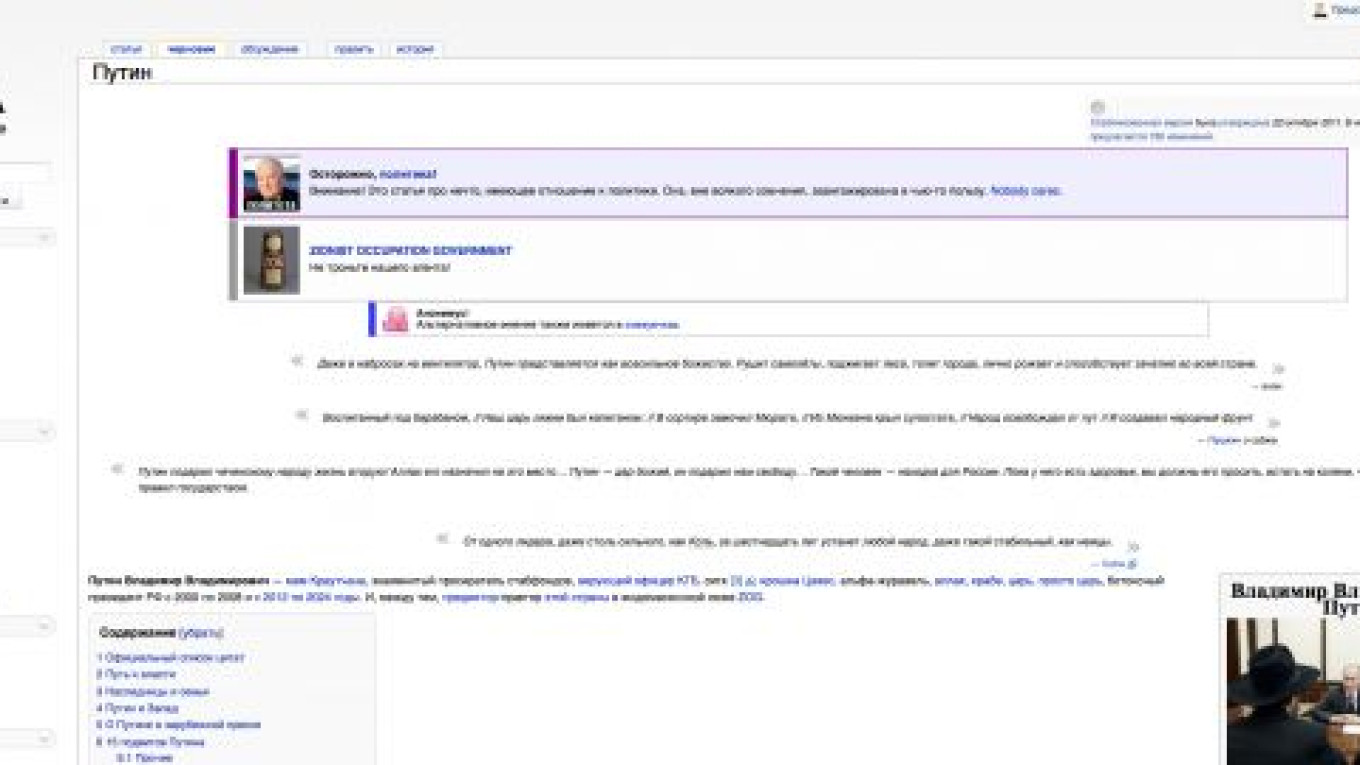As the number of websites banned or blocked under the new Internet law continues to grow, the country’s media watchdog backpedaled Tuesday by acknowledging that censoring content was technically and legally difficult, and it promised to remove popular sites from the blacklist.
The Mass Media Inspection Service said Tuesday that 41 out of 180 websites identified as harmful had been blocked because their owners failed to delete material. Internet providers are asked to block sites if owners fail to react to a warning within three days, Maxim Ksenzov, deputy head of the service, told a State Duma meeting, Interfax reported.
Ksenzov admitted that blocking does not always work well because providers lacked the necessary technical equipment. “This mechanism needs fine-tuning,” Ksenzov was quoted as saying. He added that the sanctions were difficult to enforce when a Russian site owner chooses a foreign provider.
The law, which came into effect on Nov. 1, allows the Mass Media Inspection Service to block sites without a court order if content is found to promote child pornography, suicide or drug use.
But critics say the law’s implementation lacks transparency. The blacklist is not publicly available and operates solely via the Zapret-info.gov.ru site, where users can anonymously submit information about harmful content. Affected site owners have complained that they were not warned and have questioned the blacklist’s rationale.
The country’s online community reacted with outrage Tuesday after it appeared that one of the biggest Russian-language file-sharing sites, Rutracker.org, had been blacklisted because users shared an “encyclopedia of suicide.”
Earlier, Lurkmore, a popular humorous online encyclopedia, and the “Librusek” online library were hit, the latter apparently because it offered a Russian-language copy of “The Anarchist Cookbook,” a step-by-step guide on how to make explosives written by U.S. author William Powell in 1971.
The Mass Media Inspection Service said Tuesday that it had removed Lurkmore.to from the index after the site officially told the service that it had deleted illegal content.
Ksenzov also promised that Rutracker and Librusek would be delisted immediately after their owners notify the service that the required deletions have been made, Interfax reported.
Underlining the difficulties of the ban, many Internet addresses that appeared on an of banned sites published on the Roskomsvoboda watchdog site Tuesday were available to users in Moscow. Many of the items on the list contain drug- or suicide-related information, including Fast-die.kiev.ua, which claims to sell suicide pills.
Set up by Russia’s Pirate Party, the Roskomsvoboda site provides users with information on how to get around the new “Great Russian Firewall” with anonymous proxy servers and alternative URLs.
Gennady Onishchenko, head of the Consumer Protection Service, suggested on Tuesday that the suicide-related deletions had not been ordered by him or any other government agency but by Internet users themselves.
“This wasn’t decided … by a business community that doesn’t want children jumping out of windows,” Onishchenko told Interfax.
Russia’s suicide rates are among the world’s highest, with teenage suicide statistics being three times higher than the world average, according to a UNICEF report released last year.
Some site administrators said they had been treated unfairly. The owners of Pobedish.ru, which became the first known blacklist victim last week, complained in a home-page post that it had to delete a suicide-technique discussion written by psychologists in order to discourage at-risk users.
Critics fear that the law marks an end to the country’s hitherto relatively free Internet and point to a number of initiatives from the ruling United Russia party to further restrict the Web, such as requiring users to enter passport information when registering on social networks or banning the use of anonymizing proxy servers.
They say this is in line with a wider crackdown on the opposition since Vladimir Putin’s return to the presidency. As opposed to his tech-savvy predecessor, Dmitry Medvedev, Putin has said he has little use for the Internet. Last week, his spokesman, Dmitry Peskov, supported a call to limit governors’ Twitter activity.
However, Putin said last year that he was against tighter Internet censorship.
“We have no plans to snip-snap anything,” he said in his annual Duma address, using a popular proverb about the Cheka Soviet-era secret service.
Analysts agreed that attempts to create a Russian analogue to China’s Great Firewall would be both ineffective and counterproductive.
Anton Nosik, a popular blogger and Internet expert, said the fact that popular resources like Facebook, Twitter and LiveJournal continue to work shows that the government knows its limitations.
“All this is senseless activity,” he said.
Yevgeny Remchenko, an analyst who runs the Neogeography.ru website, said the government should turn its policies around 180 degrees.
“Instead of blocking sites and creating taboo lists, they should invest in healthy, intellectually stimulating and positive campaigns,” he said.
Related articles:
A Message from The Moscow Times:
Dear readers,
We are facing unprecedented challenges. Russia's Prosecutor General's Office has designated The Moscow Times as an "undesirable" organization, criminalizing our work and putting our staff at risk of prosecution. This follows our earlier unjust labeling as a "foreign agent."
These actions are direct attempts to silence independent journalism in Russia. The authorities claim our work "discredits the decisions of the Russian leadership." We see things differently: we strive to provide accurate, unbiased reporting on Russia.
We, the journalists of The Moscow Times, refuse to be silenced. But to continue our work, we need your help.
Your support, no matter how small, makes a world of difference. If you can, please support us monthly starting from just $2. It's quick to set up, and every contribution makes a significant impact.
By supporting The Moscow Times, you're defending open, independent journalism in the face of repression. Thank you for standing with us.
Remind me later.


